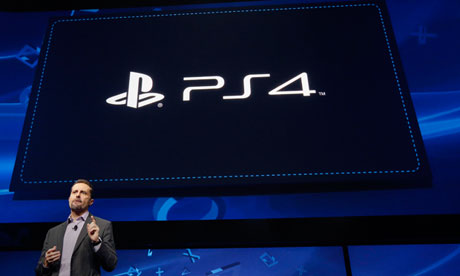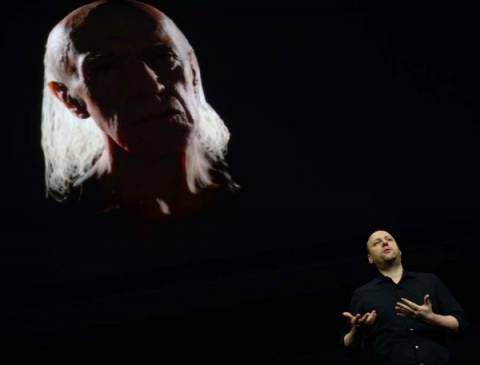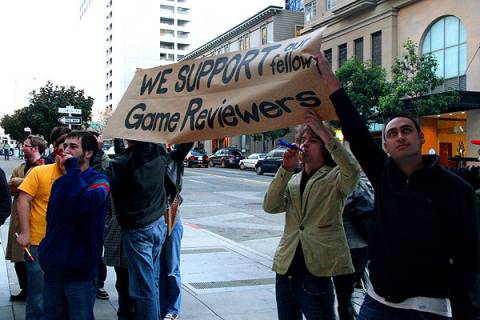Regardless of whatever reservations I may have had a couple of weeks ago, I am forced to admit that I was impressed with this past Wednesday's unveiling of the PlayStation 4. Or, to be more accurate, the unveiling of the ideas behind the PlayStation 4. Sony's initial announcement event wasn't so much a full on blitz of information on its new console, but a primer on where Sony's head is at with this thing. We now know what its horsepower will be, what the controller and its related gimmicks will look like, what Sony's been thinking about in terms of how to improve the user experience, and we heard from a number of developers about how they intend to use Sony's new gaming platform. As an initial introduction to a new piece of technology, it was about as informative as one might hope for.

No, we obviously didn't learn the price of the device, its release date beyond a somewhat nebulous holiday 2013 designation, and the box itself was absent. On that last point, I don't really understand the concern there. I've seen the box's absence pointed out as a particular folly in multiple write-ups of the event, including this piece on Wired from Stu Horvath, a writer I typically agree with. While I'm partial to attractively designed electronic boxes, it's not really the main selling point to me. So to call Sony out as some have for not showing the box strikes me as petty and maybe just a little bit beside the point. After all, aren't we really there for the games and the technology driving them? The box, according to Sony, isn't totally finalized, but the specs and user interface are at least somewhere close to it. Also, as twitter user CorySchmitz put it:
People complaining that they didn’t show the PS4 hardware: it will probably be a black rectangle.
— Cory Schmitz (@CorySchmitz) February 21, 2013
So Sony showed what it knew it could, and held back what wasn't ready for prime time. Especially when one considers that they'll have at least one more major go at this in the US at this year's E3, the fact that Sony showed as much as it did was frankly surprising to me.
Not to others, it seems. I'll hardly call the reaction to Sony's event universally negative; heck, I'm not sure it was even 50% negative. But there have been quite a few vocal voices decrying the event as sub-par or outright tragic. Since the event, the press and consumers alike have spent many a word breaking down, examining, and criticizing every minute detail of the announcement, as is custom. Every game, every technology concept, every microscopic digital car seat fiber has been examined in excruciating detail, and the opinions remain divergent and scattered. Given all this opposing feedback, what consensus conclusion should we, the gaming public, draw from all this analysis?
How about that Sony has made a new video game console, which is more powerful and feature-rich than its predecessor?
Okay, so that's hardly a thrilling revelation, but really, what else were we expecting? Sony's PlayStation 4 is and was always intended to be a video game console, with all the trappings, trimmings, and ubiquitous buzzwords one should expect from such a device. It is a more socially active console, in that it is very concerned with you being able to put any stupid thing you feel like on the Internet with only the press of a button. It has the now requisite motion controls, HD camera technology, and other various controller gadgetry one would expect a new console-maker to dream up. It has big games from big franchises that you are already intimately familiar with. It also will have smaller, less familiar games, but other than Mark Cerny's Knack, and Jonathan Blow's The Witness, we didn't see any of those. That's not surprising, considering this was a first impression event, and when you're making a first impression in the video game industry, it's a lot easier to rely on familiar franchise shorthand than brand new IPs. More specifically, it's a lot easier to point to something people know and say, "Hey, remember how this used to look?"
Considering many of us doubted as to whether Sony would have more than one or two games to show at all, I feel like maybe we're being a little unfair if we're judging Sony harshly for its showing. Am I, a consumer, terribly thrilled at the prospect of a new Killzone game? Or a PS4 port of Diablo III? Or an as-yet-unnamed Final Fantasy sequel eventually probably hopefully appearing on the system? Not really. But honestly, I wasn't necessarily that thrilled the last time new console makers first unveiled games, either. Remember when Sony used Killzone 2 as a tentpole when announcing the PS3? We were all ecstatic because the demo looked amazing technologically--not necessarily because it was a Killzone game. Of course, that demo didn't turn out to be terribly close to the final product, and other impressive looking demos shown that day, like This Is Vegas, never materialized at all.

So perhaps I am slightly confused when I see people complaining that Sony's PlayStation 4 demos didn't look more outlandishly impressive, more technologically exciting, more otherworldly compared to what the PlayStation 3 currently offers. With the exception of Capcom's Deep Down demo, which was clearly a tech demo--albeit certainly an impressive looking one--with a HUD overlaid upon it, everything in Sony's opening roster looked basically believable. That Killzone game looked like a game that could exist as a launch title on a next-gen system. So did Knack, inFamous: Second Son, DriveClub and pretty much everything else shown during the event. Basically, Sony eschewed incredulity in favor of realistic promises.
For some, maybe that's not enough. After all, it's been seven years since Sony last asked us to upgrade our PlayStation systems, and while the PS3 has its share of legacy problems and limitations, it's still a highly functional console replete with myriad media options. To inspire people to buy a new, presumably expensive media box, companies are expected to over promise the world with spurious sounding claims of technological superiority. Comparatively, Sony's PlayStation 4 announcement was peculiarly direct and maybe even a bit sobering.
Now, if you want to criticize some of the presentation choices at the event, I'm right there with you. The choice of games Sony lined up for the event definitely had a hard time meshing with the messages of change that Sony's representatives put forth while speaking on stage. That cognitive dissonance was a big part of this thoughtful takedown of the event by The Gameological Society's John Teti. In his view, Sony's words didn't jive with the sameness of the games we were being shown, that the solutions Sony offered were to invented problems, and that eviscerating older technology as the hindrance to true emotional storytelling, as Quantic Dream's David Cage did, was more than a bit ludicrous. On this last point, I agree entirely. Cage's presentation specifically called out technology limitations as a barrier to emotional connection in storytelling, while simultaneously using the classic silent film The Great Train Robbery as an example of why movies weren't interesting until the technology radically improved. It's a lame argument, one that presumes that the quality of artistic expression and the rate of technological advancement are inextricably linked. Considering we've seen no small share of terrible storytelling in the last few decades, regardless of how technology has improved, I don't think this point holds water.

But I also don't think Sony did anything particularly egregious in showing the games it did, and allowing the names it did to appear on stage. Well, with the exception of Square Enix, who clearly had no reason being out there. But beyond that, the games Sony put on stage felt like the kinds of games a company about to trumpet a new console typically does. I understand that it's been several years since we've really gone through this kind of thing on an industry-wide scale, but outside of a few awkward presentations--creepy inFamous guy, I'm looking at you--nothing stood out to me at Sony's event as particularly off or displeasing.
This, I suppose, makes me an optimist compared with some, who have called the event a mistake, or flop, or whatever else. I guess I just don't know what those who had any strong negative feelings about Sony's first showing were honestly expecting. Maybe because it's been so long since we've really been to this rodeo, not having our minds blown by what was on display was simply unacceptable. If that's the mentality you're going to take, you're likely to be very disappointed with how this industry, and frankly all iterative technology industries progress from here, because revolutions are far less common than updates. Or, as Ian Bogost put it in his write-up of the PlayStation 4 event in the Atlantic:
"We mistakenly believe that the label "next generation" implies newness and innovation, a promise of the technological utopia we've been dreaming of. But if you pause to reflect on the matter, you'll quickly realize that all those earlier generations were once next generations themselves, for some previously current generation. Innovation is like a Chinese finger trap: the more you tug deliberately at progress, the less progress you make, because the deepest, most profund novelty is the kind that blinds us to novelty. Every "next" thing shouldn't have to be a revolution. It can just be what comes next."
I don't know about the rest of you, but what's coming next sounds just fine to me. At least, so far.
--
As a complete and utter aside to any of this Sony nonsense, I felt I'd be remiss if I didn't spend at least a little time lamenting another piece of news from the past week.
We've all undoubtedly heard by now that IGN, now owned by Ziff Davis, plans to shutter several of its banner properties, including 1UP, UGO, and Gamespy. Some of the staff of those sites sound like they'll be folded back into the larger IGN whole, and if we're being completely honest, many of the writers who helped establish those brands and make them the powerhouses they were have moved on over the years. But that doesn't mean that they weren't still quality sites, and that they didn't have a place in this industry going forward.
Ziff, apparently, disagreed. Considering the company's bottom line, which appears to be to promote IGN and Ask Men at all costs, while shedding anything that isn't those two key things, I guess there never really was much hope there. Ziff didn't necessarily want 1UP, UGO, or Gamespy, but they came as part of the deal. Speaking from experience, it never bodes well when your site is thrown in as part of a package sale, versus being the target of the sale at the outset. Those sites rarely survive in a recognizable fashion, if at all.
When I began my tenure at GameSpot back in 2003, Gamespy was still a strong, independent brand that had yet to fold into the larger IGN conglomerate, UGO was still basically IGN's less video game-focused rival for the attention of young, Internet savvy males, and 1UP hadn't even launched yet, though it would soon after my arrival. People seem particularly pained by the loss of 1UP, and I don't blame them. Back in the early days, they were viewed by many I worked with as competition to be shunned, as was generally our custom. But when you met the people who worked at 1UP, and read, listened to, and watched the content they produced, you got the impression that that mentality couldn't have been further from theirs. You always got the impression that those folks cared as much about what the rest of us were doing as what they were doing, that they were paying attention, and had an active interest in what they were doing beyond the mere scope of just winning some futile traffic war.
Maybe that was true of some editors more than others, but generally, 1UP was a site I had a great deal of affection and respect for. Even as it went through transition after transition, people held that site close to their heart, because of the sense of community, the uniqueness of the content for its time, and the personalities that kept the place running.
Most importantly, places like 1UP, Gamespy and UGO were breeding grounds for great writing talent that has continued to flourish in recent years. I won't even try to name off the many, many writers and personalities I've met who either got their start, or had some of their best career years at those sites, because I know I'd forget a few, and I'd feel bad about that. Suffice it to say, they were numerous, and their contributions to our silly little line of work deserve all the warm feelings and sad lamentations that have come as a result of this news.

It's a strange thing to see these sites, once so intractably embedded in my field of vision on a day-to-day basis, go out this way. Especially when you consider that the consoles and platforms these sites covered for so many years are about to go away as well, giving way to a new generation of hardware. Does this mean we're giving way to a new generation of sites? A new generation of video games coverage the likes of which we scarcely know or understand? Hell, I don't know. I suspect not, but that's only because I feel like these changes have been coming for a while. Many of the sites that existed on the periphery at the outset of this past generation have skyrocketed in recent years. Blogs, mainstream media corporations, online video channels, it's all kind of blended together into this strange, unrecognizable beast, at least insofar as it compares to the industry I entered into ten years ago.
That's not necessarily a bad thing. While I share this writer's pessimism in terms of the profitability of our profession at large, I do feel that in the last few years, the content, both in volume and quality, has improved exponentially. Say what you want about the blogification of media, but I've read more interesting thoughts about video games in the last couple of years than I probably did in the previous ten. And I think we owe more than a little bit of that to sites like 1UP and Gamespy, who helped inspire many of these new writers and their perspectives we've now come to enjoy.
To those impacted by the layoffs at these sites, know that your work over the years has been appreciated by myself and countless others, and that we're all looking forward to seeing what's next for you.
--A